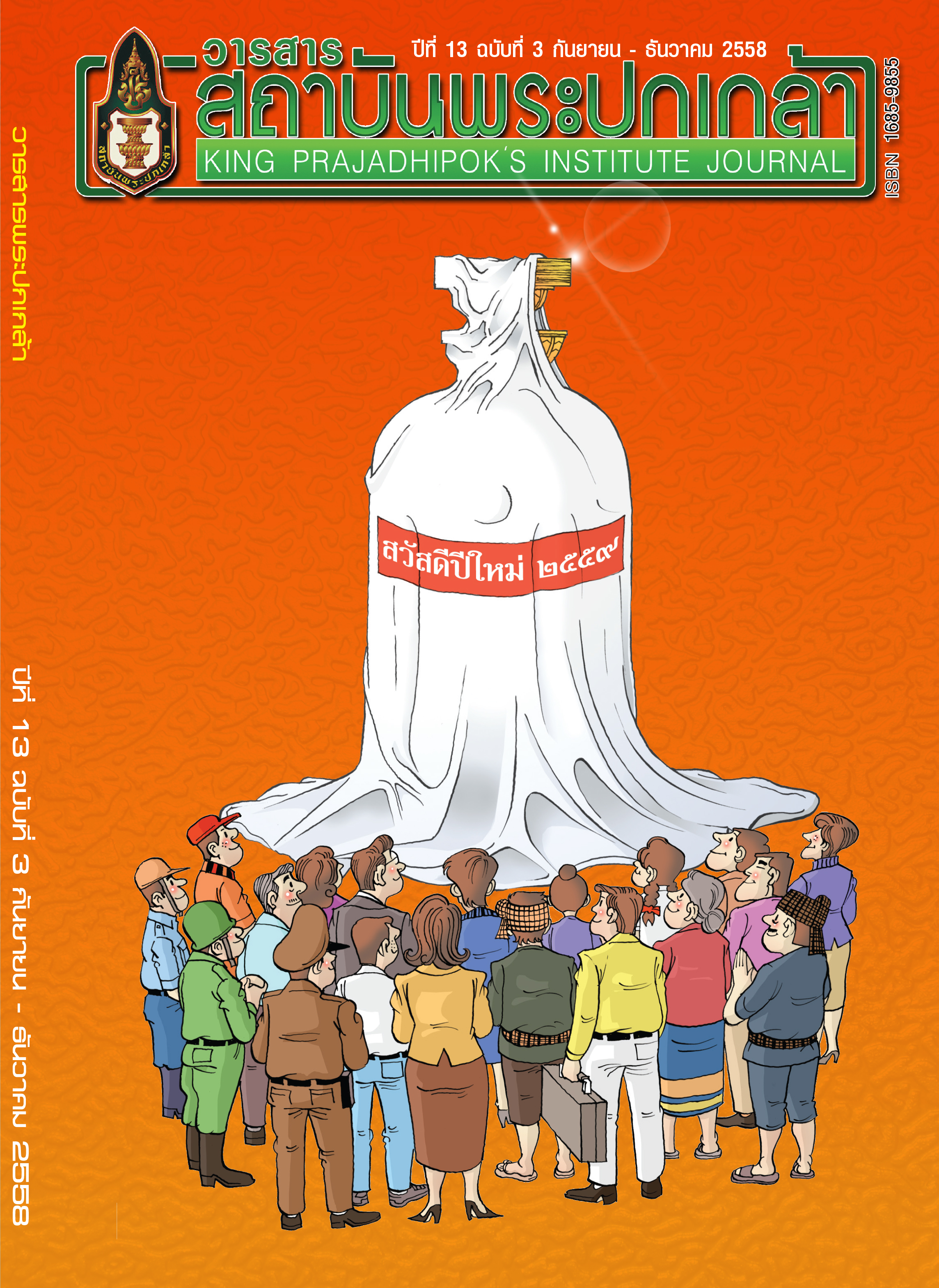Thailand’s Members of Parliament and the Concept of Representativeness at the National Level
Main Article Content
Abstract
This article aims to study the role of members of parliament within the framework of State Orientation Theory. The article focuses on the role perception plays in MP’s , considered in relation to IPU indicators: (1) their background, including years of political experience; (2) the size of their political party and their status in the parliament; (3) the expectations of the people who voted for them, as, factors for analyzing their behavior
and actual performance in undertaking their duties as the members of the parliament. The author has developed the IPU’s ideas based on the version King Prajadhipok’s Institute suggested as a benchmark.
The article suggests that the background of the MP’s is significant in how they perform their duties in the national assembly because this factor directly affects their perception, to the extent that it controls their mindset towards their actions.
The article will also suggest the ways in which the members of parliament should improve their performance based on their attitude and perception of the wider electoral mandate in order to perform their duty as MP’s, not only as a member of a political party.
Article Details
@ 2020 King Prajadhipok's Institute The Government Complex Commemorating All Right Reserved.
References
กนก วงษ์ตะหง่าน. 2530. การเมืองในสภาผู้แทนราษฎร. กรุงเทพฯ : สำนักพิมพ์จุฬาลงกรณ์มหาวิทยาลัย.
กนกวรรณ พรประสิทธิ์. 2551. บทบาทของสมาชิกสภาผู้แทนราษฎรฝ่ายเสียงข้างน้อยในระบบรัฐสภากับปัญหาตามรัฐธรรมนูญ : ศึกษากรณี การตรวจสอบฝ่ายบริหาร. กรุงเทพฯ : มหาวิทยาลัยธรรมศาสตร์.
ฐิติกร สังข์แก้ว. 2555. ตัวแบบ ‘ความเป็นตัวแทน’ ในพื้นที่การเมืองสมัยใหม่: บทนำเสนอเบื้องต้นว่าด้วยบทบาทและนัยเชิงทฤษฎี. กรุงเทพฯ : มหาวิทยาลัยธรรมศาสตร์.
ธงชัย วงศ์ชัยสุวรรณ. 2546. รายงานการวิจัย เรื่อง ความคาดหวังในบทบาทและการกระทำหน้าที่ของสมาชิกสภาผู้แทนราษฎรของประชาชนในจังหวัดเชียงใหม่ เชียงราย และจังหวัดอื่นๆ ในภาคเหนือ. กรุงเทพฯ : มหาวิทยาลัยธรรมศาสตร์.
พรเพ็ญ วโรภาษ. 2539. การมองบทบาทตนเองและการรับฟังมติมหาชนของสมาชิกสภาผู้แทนราษฎร : ศึกษาเฉพาะกรณีสมาชิกสภาผู้แทนราษฎรไทยที่ได้รับการเลือกตั้งเมื่อ 2 กรกฎาคม 2538. กรุงเทพฯ : มหาวิทยาลัยธรรมศาสตร์.
รัฐธรรมนูญแห่งราชอาณาจักรไทย พุทธศักราช 2550.
วรเจตน์ ภาคีรัตน์. 2554. รายงานการศึกษาวิจัย เรื่อง บทบาทและอำนาจหน้าที่ของสมาชิกรัฐสภาในการรักษาวินัยพรรคการเมืองและการปฏิบัติหน้าที่ในฐานะผู้แทนปวงชน. นครปฐม : บริษัท มิสเตอร์ก๊อปปี้.
วิศิษฎ์ เอี่ยมบริบูรณ์. 2530. ความเข้าใจบทบาทตนเองในการเป็นตัวแทนของสมาชิกสภาผู้แทนราษฎร ศึกษาเฉพาะกรณีสภาผู้แทนราษฎรไทยปี 2526. กรุงเทพฯ : มหาวิทยาลัยธรรมศาสตร์.
สำนักวิจัยและพัฒนา สถาบันพระปกเกล้า. 2555. บทสรุปผู้บริหาร : สถาบันการเมืองกับการพัฒนาประชาธิปไตย : การดำเนินงานของรัฐสภาตามเกณฑ์และตัวชี้วัดของสหภาพรัฐสภา (Inter-Parliamentary Union : IPU). กรุงเทพฯ : บริษัท เอ.พี. กราฟฟิค ดีไซน์และการพิมพ์ จำกัด.
สิริพรรณ นกสวน สวัสดี. 2552. ความเป็นตัวแทน กลไกตรวจสอบ และระบบเลือกตั้ง: ข้อคิดในการออกแบบสถาบันการเมือง. รัฐศาสตร์สาร. 30 (1) : 403 - 452. กรุงเทพฯ : โรงพิมพ์มหาวิทยาลัยธรรมศาสตร์.
สำนักวิจัย สถาบันบัณฑิตพัฒนบริหารศาสตร์. 2546. รายงานการวิจัย เรื่อง บทบาทและความรับผิดชอบของสมาชิกสภาผู้แทนราษฎรและสมาชิกวุฒิสภาในอนาคตตามทัศนะของประชาชน. กรุงเทพฯ : สำนักการพิมพ์ สำนักงานเลขาธิการสภาผู้แทนราษฎร.
Joseph LaPalombara and Myron Weiner. 1972. “The Impact of Parties on Political Development” in Political Parties and Political Development. N.J. : Princeton University Press.
Norman Miller. 1967. “Representational Role Type : A Research Note” in The American Political Science Review. 61.


